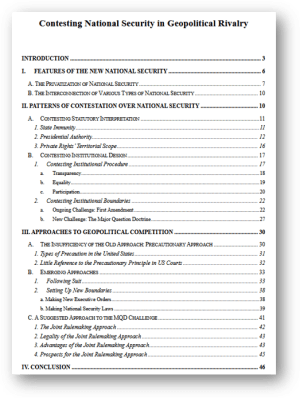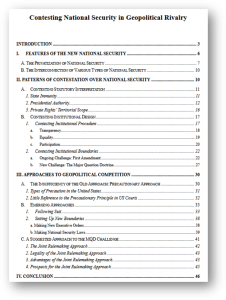Today’s guest post is from Ji Ma, a candidate for a Doctor of Juridical Sciences (S.J.D.) degree here at Duke Law. He invites us to take a look at his forthcoming article, which will be published in the Montana Law Review. (However, it is already available on SSRN and can be found here.)
Entitled Contesting National Security amid Geopolitical Rivalry Ji Ma says it “focuses on the circular interaction among geopolitical competition, contestation, and legal development.” As he puts it:
“In an era of escalating geopolitical rivalry, the very foundation of global order—legal norms—becomes another battlefield. Among contested norms, rival powers are deeply disputing one abstract, encompassing, and fluid norm: national security.”
What makes his paper especially timely is a Federal court decision from just a few days ago that I think exemplifies the “contestation” Ji Ma references. Here’s part of a report from Reuters:
Sept 26 (Reuters) – A U.S. judge on Friday rejected a bid by China-based DJI, the world’s largest drone maker, to be removed from the U.S. Defense Department’s list of companies allegedly working with Beijing’s military.
In his ruling U.S. District Judge Paul Friedman in Washington, D.C., said the Defense Department had substantial evidence supporting its finding that DJI, which sells more than half of all U.S. commercial drones, contributes to the “Chinese defense industrial base.”
The report notes that the company insists it “is neither owned nor controlled by the Chinese military.” Reuters further states that the judge explained that “placement on the Pentagon list can prevent a company from accessing certain U.S. contracts, grants, and other programs.” The article also observes that “U.S. companies face increased national security risks if they do business with an entity that the Defense Department has accused of working with the Chinese military.”
Although this decision obviously comes after Ji Ma completed his article, I believe it illustrates the kind of litigation that we can expect to continue seeing, given, as Ji Ma says, that we live “[i]n an era of escalating geopolitical rivalry.”
Here’s Ji Ma’s further description of his “deep dive” essay:
 The Background and the Argument
The Background and the Argument
In an era of escalating geopolitical rivalry, the very foundation of global order—legal norms—becomes another battlefield. Among contested norms, rival powers are deeply disputing one abstract, encompassing, and fluid norm: national security.
This Article argues that the contestation over national security can impact legal development, which in turn would significantly impact geopolitical competition. The contestation over national security focuses on two patterns: the interpretation and application of national security, and the institutional design to address it. Such contestation contributes to the development of norms, which in turn impact geopolitical competition.
For instance, U.S. courts have traditionally applied the political question doctrine to avoid reviewing matters closely related to national security. However, as the U.S.-China rivalry intensifies and the U.S. government increasingly issues executive orders and regulations to restrict Chinese companies, more Chinese companies have sought judicial remedies in the U.S., challenging the longstanding political question doctrine.
Consequently, U.S. courts have been compelled to re-examine national security issues by interpreting the Constitution and federal statutes, leading to significant shifts in jurisprudence, the balance of power among the three branches of the government, and the dynamics of the U.S.-China rivalry.
The Implication of this Article
The Article advances scholarship in three ways. First, it provides a framework for understanding legal developments via contestation amid geopolitical competition. There is abundant scholarship to study how law can promote economic and social development. By contrast, this article focuses on the circular interaction among geopolitical competition, contestation, and legal development.
Second, the Article deepens debates on the issue of national security from a novel angle. Scholarship on national security focus either on domestic or public international law. This Article broadens the research horizon to explore national security amid geopolitical competition.
Third, looking to the road ahead, this Article proposes how legal development could affect the ongoing race by synthesizing emerging approaches and suggesting a novel approach to national security amid contestation.
The Structure of this Article
This Article proceeds as follows: Part I explores two key trends featuring this rivalry: the privatization of national security, exemplified by the growing security and geopolitical roles of private platforms; and the interconnectedness of national security due to the “national securitization” of various areas, including information privacy, climate change, and public health.
Part II synthesizes two patterns of contestation over national security. The first focuses on the application of national security in a given scenario. Specifically, it investigates issues like state immunity, presidential authority, and rights’ territorial scope. The second addresses institutional design in managing national security—namely, which institutions should enforce, review, or adjudicate national security issues. It addresses institutional procedures and institutional boundaries in addressing the issue of national security.
Part III examines how contestation over national security contributes to normative and institutional development, which in turn affects the geopolitical competition. It reveals the insufficiency of the old approach—the precautionary approach to national security, then it distills two emerging approaches to national security: following suit; and setting up new boundaries. Finally, it suggests a novel approach to the yet-to-be-addressed challenge.
Part IV concludes this Article with practical implications in shifting the rival power to influence geopolitical competition.
Again, you can find his article here.
About the Author
 Before coming to Duke, Mr. Ji MA studied at Peking University, Oxford University, and Yale Law School. Now he is reading his SJD program at Duke Law. His academic interests are in multinational corporations, international economic law, and international environmental law, and national security. His writings will appear or have appeared in the Cornell International Law Journal, Vanderbilt Journal of Transnational Law, Journal of World Investment & Trade, and book chapters published by Cambridge University Press, among others.
Before coming to Duke, Mr. Ji MA studied at Peking University, Oxford University, and Yale Law School. Now he is reading his SJD program at Duke Law. His academic interests are in multinational corporations, international economic law, and international environmental law, and national security. His writings will appear or have appeared in the Cornell International Law Journal, Vanderbilt Journal of Transnational Law, Journal of World Investment & Trade, and book chapters published by Cambridge University Press, among others.
The views expressed by guest authors do not necessarily reflect my views, those of the Center on Law, Ethics and National Security, or Duke University. See also here.
Remember what we like to say on Lawfire®: gather the facts, examine the law, evaluate the arguments – and then decide for yourself!
Related

